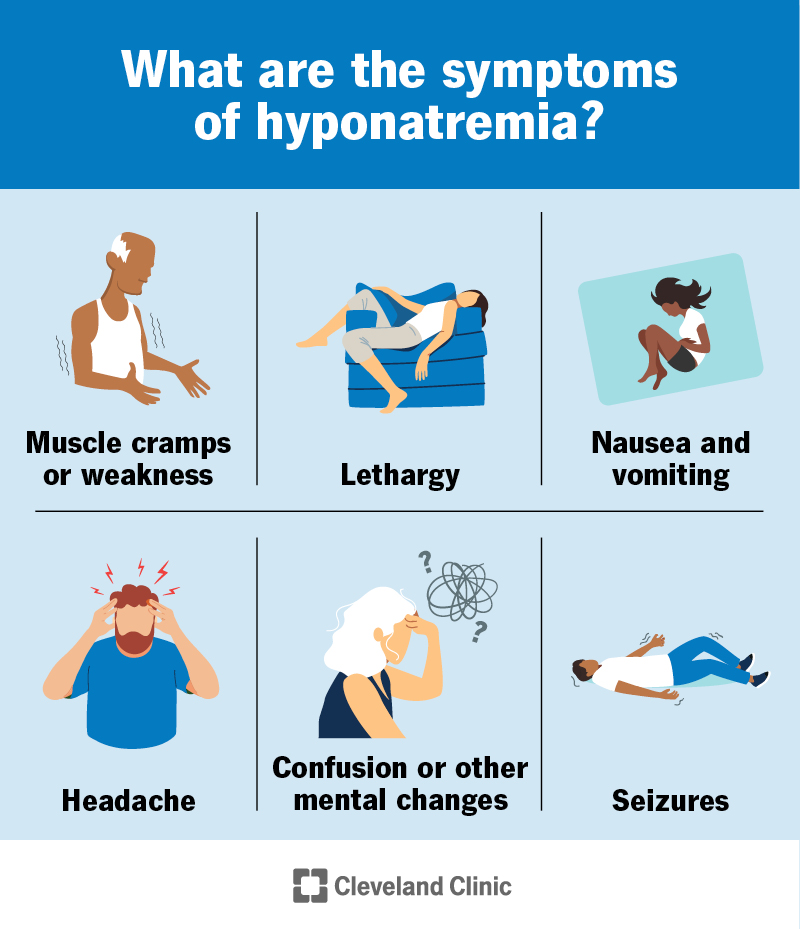Hyponatremia is when the amount of sodium in your blood is too low. Common causes include heart, liver, kidney and brain diseases, hormone issues and medications. Treatment could include limiting water intake, getting IV fluids and adjusting medications.
Advertisement
Cleveland Clinic is a non-profit academic medical center. Advertising on our site helps support our mission. We do not endorse non-Cleveland Clinic products or services. Policy

Image content: This image is available to view online.
View image online (https://my.clevelandclinic.org/-/scassets/images/org/health/articles/hyponatremia)
Hyponatremia is when your blood sodium (salt) level is lower than it should be. Healthcare providers consider sodium (Na+) levels below 135 milliequivalents/liter (mEq/L) to be lower than normal.
Advertisement
Cleveland Clinic is a non-profit academic medical center. Advertising on our site helps support our mission. We do not endorse non-Cleveland Clinic products or services. Policy
It might seem like very little salt would be a good thing. But like many things in life, it’s all about balance. You need the right balance of water and sodium in your body to stay healthy. They can become unbalanced due to medical conditions or medications. When this happens, water moves into your tissues, causing them not to work properly. This can be especially dangerous in your brain.
If your kidneys are working as they should, drinking too much water almost never causes your blood sodium to fall too low unless you’re very dehydrated (like after running a marathon) and you don’t replace electrolytes (important minerals that keep your body working) at the same time.
Hyponatremia can be chronic or acute. Chronic hyponatremia can happen over a long time, with symptoms coming on slowly and your body making adjustments for the low sodium levels. With acute hyponatremia, blood sodium levels fall quickly, and your symptoms may become severe suddenly.
Types of hyponatremia include:
Advertisement
Knowing which type of hyponatremia you have helps your healthcare provider diagnose the cause and determine treatment.
Symptoms of hyponatremia include:
In most cases, high levels of water in your body — which dilute sodium levels — cause hyponatremia. Losing a lot of sodium from your body can also cause it (this is less common). When water and sodium levels in your body are unbalanced, fluid can move into your cells and prevent them from working properly.
Specific causes of hyponatremia include:
You’re more likely to develop hyponatremia if you have any of the ongoing medical conditions that cause it. Having surgery can also increase your risk.
Yes. Severe hyponatremia can cause swelling in your tissues, including your brain. Untreated, this can lead to coma, permanent brain damage or death.
Healthcare providers use blood tests and urine (pee) tests to diagnose hyponatremia. They’ll check the levels of sodium, potassium, hormones and other substances in your body. They’ll also check how well your kidneys and liver are working. Depending on your symptoms, your provider might get imaging, like a CT scan or chest X-ray.
Your provider may ask you about:
Treatment for hyponatremia depends on the cause and what kind of hyponatremia you have. Treatments could include:
Your provider may also treat you for ongoing medical conditions that could lead to hyponatremia.
Healthcare providers are careful not to overcorrect when treating hyponatremia. Increasing sodium levels in your body too quickly can cause life-threatening side effects, like central pontine myelinolysis or osmotic demyelination syndrome. These are types of brain damage. This is why it’s important to see a healthcare provider right away if you think you have hyponatremia.
Advertisement
The outlook for hyponatremia depends a lot on the cause. Many people who get quick treatment can make a full recovery. If you have brain swelling that doesn’t resolve quickly, it can lead to permanent damage.
But sometimes, hyponatremia is a sign that an ongoing medical condition is getting worse. In general, people with kidney or liver disease have a higher mortality (death) rate than people with other causes of hyponatremia.
You can reduce your risk of hyponatremia by:
Talk to your provider if you have a medical condition that increases your risk for hyponatremia. They can help you manage your health and know what signs to look for.
Chronic hyponatremia may have symptoms that come on slowly, like tiredness or difficulty thinking. Talk to your provider if you notice even small changes in how you feel, especially if they get worse over time.
Advertisement
Go to the emergency room if you or someone you know experiences:
It might be helpful to ask a healthcare provider:
You should follow the recommendations of a healthcare provider if your blood sodium is too low. Treatment depends on the cause, and eating too much sodium can cause additional medical issues.
We tend to think of salt as a bad thing — but like everything, we need balance. Too little sodium can cause serious health problems. Hyponatremia is common, and most people fully recover if they’re treated right away. But many things can cause hyponatremia, so managing ongoing medical issues and medications is the best way to reduce your risk. Don’t hesitate to ask your provider if you have any questions or concerns.
Advertisement

Sign up for our Health Essentials emails for expert guidance on nutrition, fitness, sleep, skin care and more.
Learn more about the Health Library and our editorial process.
Cleveland Clinic’s health articles are based on evidence-backed information and review by medical professionals to ensure accuracy, reliability and up-to-date clinical standards.
Cleveland Clinic’s health articles are based on evidence-backed information and review by medical professionals to ensure accuracy, reliability and up-to-date clinical standards.
If you have a condition that’s affecting your kidneys, you want experts by your side. At Cleveland Clinic, we’ll work with you to craft a personalized treatment plan.
